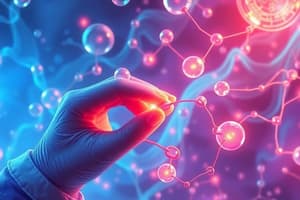Podcast
Questions and Answers
Which process in pharmacokinetics involves breaking down a drug into smaller molecules that can be easily eliminated?
Which process in pharmacokinetics involves breaking down a drug into smaller molecules that can be easily eliminated?
- Excretion
- Metabolism (correct)
- Distribution
- Absorption
What is the main outcome of drug interactions involving additive interaction?
What is the main outcome of drug interactions involving additive interaction?
- The drugs cancel out each other's effects
- The combined effect is less than the sum of individual effects
- The combined effect is greater than the sum of individual effects (correct)
- There are no noticeable effects
What is the main focus of pharmacology?
What is the main focus of pharmacology?
- Analyzing the psychological effects of drugs
- Understanding the mechanisms of drug manufacturing
- Exploring the molecular structure of drugs
- Studying the effects of drugs on the body (correct)
Why is understanding pharmacokinetics essential in drug administration?
Why is understanding pharmacokinetics essential in drug administration?
Which classification of drugs is based on their therapeutic effects?
Which classification of drugs is based on their therapeutic effects?
What type of reaction occurs when a drug directly affects a specific body organ or system?
What type of reaction occurs when a drug directly affects a specific body organ or system?
What study involves understanding how drugs bind to specific receptors in the body and produce their effects?
What study involves understanding how drugs bind to specific receptors in the body and produce their effects?
Which type of drug interaction results in a reduced overall effect due to one drug counteracting the effect of another?
Which type of drug interaction results in a reduced overall effect due to one drug counteracting the effect of another?
What are adverse drug reactions (ADRs) caused by an indirect effect on a body organ or system called?
What are adverse drug reactions (ADRs) caused by an indirect effect on a body organ or system called?
How are drugs classified based on their chemical composition known as?
How are drugs classified based on their chemical composition known as?
Flashcards
Pharmacology
Pharmacology
The study of drugs and their effects on the body.
Pharmacokinetics
Pharmacokinetics
Study of how drugs are absorbed, distributed, metabolized, and excreted.
Absorption
Absorption
The process by which a drug enters the bloodstream.
Distribution
Distribution
Signup and view all the flashcards
Metabolism
Metabolism
Signup and view all the flashcards
Excretion
Excretion
Signup and view all the flashcards
Drug Interactions
Drug Interactions
Signup and view all the flashcards
Pharmacodynamics
Pharmacodynamics
Signup and view all the flashcards
Adverse Drug Reactions (ADRs)
Adverse Drug Reactions (ADRs)
Signup and view all the flashcards
Drug Classification
Drug Classification
Signup and view all the flashcards
Study Notes
General Pharmacology: Understanding the Basics
Pharmacology is the branch of medicine that deals with the study of drugs and their effects on the body. It encompasses various aspects, including pharmacokinetics, drug interactions, pharmacodynamics, adverse drug reactions, and drug classification.
Pharmacokinetics
Pharmacokinetics is the study of how drugs are absorbed, distributed, metabolized, and excreted by the body. The four main processes in pharmacokinetics are:
- Absorption: This refers to the process by which a drug enters the bloodstream after being administered.
- Distribution: Once absorbed, the drug travels through the bloodstream and distributes throughout the body.
- Metabolism: This is the process by which the body breaks down the drug into smaller molecules that can be easily eliminated.
- Excretion: The final process involves the elimination of the drug and its metabolites from the body.
Understanding pharmacokinetics is essential for determining the optimal dosage, frequency, and method of drug administration.
Drug Interactions
Drug interactions occur when two or more drugs are taken simultaneously and affect each other's pharmacokinetics or pharmacodynamics. There are three main types of drug interactions:
- Additive interaction: Both drugs have the same effect on the body, and their combined effect is the sum of their individual effects.
- Antagonistic interaction: One drug counteracts the effect of another, resulting in a reduced overall effect.
- Synergistic interaction: The combined effect of the drugs is greater than the sum of their individual effects.
Pharmacodynamics
Pharmacodynamics is the study of how drugs bind to specific receptors in the body and produce their effects. This process involves understanding the receptors, their ligands (the drugs that bind to them), and the resulting physiological effects.
Adverse Drug Reactions
Adverse drug reactions (ADRs) are unwanted effects that occur when a drug is taken. They can be caused by a direct effect of the drug on a specific body organ or system, or by an indirect effect on a body organ or system. Common types of adverse reactions include allergic reactions, toxic reactions, and idiosyncratic reactions.
Drug Classification
Drugs are classified based on their therapeutic effects, chemical composition, and pharmacological actions. The main drug classifications are:
- Therapeutic classification: This classification is based on the drugs' therapeutic effects.
- Chemical classification: Drugs are classified based on their chemical composition.
- Pharmacological classification: This classification is based on the drugs' pharmacological actions.
Understanding the basics of general pharmacology, including pharmacokinetics, drug interactions, pharmacodynamics, adverse drug reactions, and drug classification, is crucial for healthcare professionals to make informed decisions about drug treatment, dosage, and administration.
Studying That Suits You
Use AI to generate personalized quizzes and flashcards to suit your learning preferences.
Description
Test your understanding of the fundamental concepts in pharmacology, including pharmacokinetics, drug interactions, pharmacodynamics, adverse drug reactions, and drug classification. This quiz covers essential knowledge for healthcare professionals involved in drug treatment and administration.



